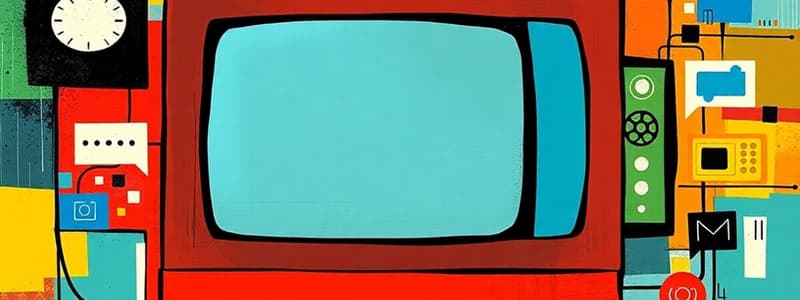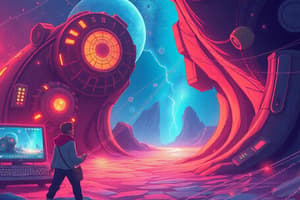Podcast
Questions and Answers
Which competency involves critiquing the techniques and messages used by the media?
Which competency involves critiquing the techniques and messages used by the media?
- Analyzing media techniques (correct)
- Making effective use of media
- Using media creatively
- Identifying harmful content
Which competency focuses on expressing ideas and opinions through media?
Which competency focuses on expressing ideas and opinions through media?
- Identifying unsolicited content
- Using media creatively (correct)
- Analyzing media messages
- Making use of democratic rights
What is a key reason for the importance of Media Literacy?
What is a key reason for the importance of Media Literacy?
- To restrict access to media content
- To promote uniform opinions on media
- To adapt to the changes in media usage (correct)
- To eliminate the need for media consumption
Which competency involves actively questioning and challenging harmful media content?
Which competency involves actively questioning and challenging harmful media content?
What is one of the outcomes of having strong Media Literacy skills?
What is one of the outcomes of having strong Media Literacy skills?
During which age was oral tradition the primary form of communication?
During which age was oral tradition the primary form of communication?
Which of the following best describes media convergence?
Which of the following best describes media convergence?
What technology initiated the Electronic Age?
What technology initiated the Electronic Age?
What is a defining characteristic of the Digital Age?
What is a defining characteristic of the Digital Age?
In the context of media evolution, what is the significance of the Literate Age?
In the context of media evolution, what is the significance of the Literate Age?
Which media type is categorized as traditional media?
Which media type is categorized as traditional media?
Which statement about the Print Age is accurate?
Which statement about the Print Age is accurate?
What role has new media played in the changes in media consumption?
What role has new media played in the changes in media consumption?
What does the term 'media' refer to in contemporary communication?
What does the term 'media' refer to in contemporary communication?
What aspect does Marshall McLuhan emphasize with his statement 'the medium is the message'?
What aspect does Marshall McLuhan emphasize with his statement 'the medium is the message'?
Which component is NOT typically considered part of early communication models?
Which component is NOT typically considered part of early communication models?
What was the primary function of 'medium' in early communication models?
What was the primary function of 'medium' in early communication models?
Which of the following phrases best describes the evolution of media according to the provided content?
Which of the following phrases best describes the evolution of media according to the provided content?
The activity involving categorizing different media types helps in understanding what aspect of media?
The activity involving categorizing different media types helps in understanding what aspect of media?
Which medium was historically associated with passive consumption of information?
Which medium was historically associated with passive consumption of information?
When analyzing the relationship between communication and media, which aspect is most emphasized?
When analyzing the relationship between communication and media, which aspect is most emphasized?
What is the first component of media literacy according to Livingstone?
What is the first component of media literacy according to Livingstone?
Which competency relates to the effective use of media technologies for content storage and sharing?
Which competency relates to the effective use of media technologies for content storage and sharing?
By which criteria should media forms and content be evaluated according to Livingstone's definition?
By which criteria should media forms and content be evaluated according to Livingstone's definition?
What does Ciurel’s definition of media literacy emphasize in relation to public education?
What does Ciurel’s definition of media literacy emphasize in relation to public education?
According to Ciurel, what is necessary for making informed choices about media content?
According to Ciurel, what is necessary for making informed choices about media content?
Which aspect is NOT part of Livingstone's definition of media literacy?
Which aspect is NOT part of Livingstone's definition of media literacy?
What is a key responsibility mentioned by Livingstone in media literacy?
What is a key responsibility mentioned by Livingstone in media literacy?
Which of the following is one of the four components of media literacy identified by Livingstone?
Which of the following is one of the four components of media literacy identified by Livingstone?
What characterizes the current change in media production and consumption?
What characterizes the current change in media production and consumption?
How has audience engagement in media consumption changed?
How has audience engagement in media consumption changed?
What role do media companies have regarding user-generated content in today's landscape?
What role do media companies have regarding user-generated content in today's landscape?
What enables consumers to engage in collaboration with media companies?
What enables consumers to engage in collaboration with media companies?
Why is it incorrect to say the audience in traditional media is entirely inactive?
Why is it incorrect to say the audience in traditional media is entirely inactive?
What does the term 'media convergence' primarily refer to?
What does the term 'media convergence' primarily refer to?
How do media companies track consumer behavior today?
How do media companies track consumer behavior today?
What change has occurred regarding consumption being a communal experience?
What change has occurred regarding consumption being a communal experience?
Flashcards are hidden until you start studying
Study Notes
Evolution of Media
- Tribal Age: Characterized by face-to-face communication and oral traditions as primary means of sharing information.
- Literate Age: Known as the visual era where understanding written words became essential for communication.
- Print Age: Emerged with the invention of the printing press, making newspapers and publications the main sources of information.
- Electronic Age: Initiated by the telegraph, followed by the rise of radios and televisions as key media technologies.
- Information Age (Digital Age): Triggered by the invention of the internet, fundamentally transforming communication.
Types of Media
- Print Media: Includes newspapers, magazines, and other printed materials.
- Broadcast Media: Encompasses television and radio as forms of mass communication.
- New Media: Defines digital platforms and internet-based communications like social media, blogs, and streaming services.
- Traditional Media: Refers to conventional forms of media like print, radio, and television before the digital explosion.
Media Convergence
- Definition: The integration of various media technologies into singular devices, such as smartphones, which perform multiple roles (e.g., communication, information access).
- Impact: Changes how media is produced and consumed, blurring the lines between different media types.
Changes in Media Production and Consumption
- User-Generated Content: Media production is no longer limited to large companies; average users can create and share content.
- Active Engagement: Online users participate actively in information dissemination compared to passive consumption in traditional media.
- Content Scouting: Media companies increasingly seek user-generated content for diverse perspectives and authenticity.
- Collaborative Consumption: Consumers can engage with producers, influencing content creation through feedback mechanisms.
- Communal Experience: Media consumption is often a shared experience, enabling interactions among audiences.
Media Literacy
- Definition: The ability to access, analyze, evaluate, and create media messages across various formats and contexts.
- Four Components:
- Access: Understanding how to engage with different media forms.
- Analysis: Ability to analyze production and consumption aspects of media.
- Evaluation: Critically assess media forms based on various criteria (aesthetic, political, ideological).
- Creation: Responsibility to produce quality content reflecting a deep understanding of media conventions.
Competencies of Media Literacy (Ciurel, 2016)
- Effective Use of Technology: Proficiency in accessing and managing media content.
- Informed Choices: Ability to critically choose from diverse media sources and forms.
- Understanding Production: Insight into how media content is created and the motives behind it.
- Critical Analysis: Skills to dissect techniques, languages, and conventions in media messages.
- Creative Expression: Using media for communication of ideas and opinions.
- Challenging Harmful Content: Recognizing and addressing potentially harmful media.
- Civic Engagement: Utilizing media to fulfill democratic and civic responsibilities.
Importance of Media Literacy
- Dynamic Landscape: As media evolves, it shapes society and influences perceptions, necessitating continuous adaptation.
- Empowerment: Learning to navigate media effectively can lead to safer and more informed interactions, benefiting individuals and communities alike.
Studying That Suits You
Use AI to generate personalized quizzes and flashcards to suit your learning preferences.




